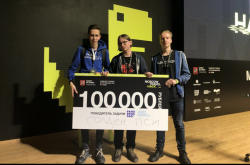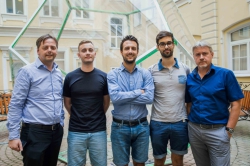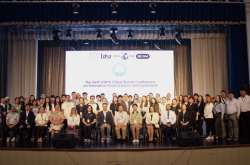World Expos are held once every five years and last up to six months. The last expo took place in Milan in 2015, and the next one will be in Dubai in 2020. At 555 hectares, the territory reserved for Expo 2025 in Yekaterinburg is the biggest ever. Here, the Smart City complex will bring together the most advanced technologies designed to improve humanity’s quality of life.

The opportunity to become a part of this initiative was available to everyone with an idea and the skills to implement it. Hackathon 2025 was held in two formats: an ideas competition (for concepts and projects) and an IT-Hackathon. Over the course of two days, teams brainstormed their project concepts for cities of the future. For the IT-Hackathon, participants had 24 hours to develop an IT solution in any of the 10 possible categories including transportation, safety, construction, education, medicine, ecology and others. Teams worked simultaneously in Moscow, St. Petersburg and Yekaterinburg, presenting their work to a single jury team made up of members of the Expo 2025 application committee, business representatives and staff of Russian state corporations. 738 applications were made, and 125 projects participated.
“Taking part in events like this that encourage project work lets students demonstrate their skills and knowledge of modern tech, increase their teamwork skills and present their ideas. All that has to be done in a short amount of time. Successful projects may secure funding and support from businesses,” – says Alexander Dorofeev, head of ITMO’s Innovative Projects Unit.
Throughout the hackathon, more than 50 members of the jury communicated with the participants. For the St. Petersburg venue, representatives of companies InfoWatch, NP RusSoft and others were also present along with experts and mentors. When choosing the winners, juries considered three criteria – a project’s applicability to any location in the world, its viability and its impact on quality of life. The total prize pool amounted to 1,000,000 rubles.

According to RUSBASE, here are the top seven teams chosen by the jury:
- “Creation of Skin Equivalent” (Medicine, ideas competition, Yekaterinburg) – this team has developed a method for creation of artificial organs. Prize – 100,000 rubles.
- Team “Phoenix” (Entertainment, ideas competition, Moscow) presented a concept of unique spaces where foster families can spend their leisure time. Prize – 100,000 rubles.

Team Phoenix. Credit: rb.ru - “Third Opinion” (Medicine, ideas competition, Moscow) is a service that helps users track their health and take note of deviations from the norm. Prize – 100,000 rubles.
- EcoFacade 2.0 (Construction, ideas competition, Moscow) proposes using natural lighting to power bioreactors with microalgae that would create oxygen and purify the air in residential and office buildings. Prize – 100,000 rubles.
- Team DeafKIT (Entertainment, IT-Hackathon, Moscow) developed an algorithm that automates sign language translation in real-time. Prize: 200,000 rubles.
- Team EORA (IoT, IT-Hackathon, Moscow) presented a next-gen streetlight capable of analyzing and identifying different types of outdoor noise, contacting authorities and sharing a 5G internet connection. Prize – 200,000 rubles.
- Team Boontar Live (Fintech & Retail, IT-Hackathon, Moscow) created an online sales and purchases service that provides live streaming of the stores and their stock. Prize – 200,000 rubles.

And here are the teams that represented St. Petersburg at the IT-Hackathon:
- Team RCAS (Security) proposed an IoT system for residential buildings. The automated system will let house management, government bodies and construction companies control the infrastructure within a set territory (buildings, public spaces, adjacent grounds).
- Team Ruby (Education) presented a project for continuous education through VR. Using the developers’ software, any user can learn using only a VR headset. Education is gamified for both children and adults, while the acquired points are spent on real-life discounts and bonuses.
- Project STID (Smart houses) integrates a neural network into a smart house. Team members made a smart house controller cheaper by stripping it of unnecessary details. The controller can regulate lighting, climate and other parameters of the house.
- Safe City project (Security) proposes using independent sensors during building construction by implanting them into roads and bridges to measure vibration.
- Team Astma Care (Medicine) proposed a system for automated peakflowmetry (the measurement of peak exhalation speed of asthma patients). Participants have created software that analyzes data from peakflowmetry devices to ensure that patients take their medicine at proper times and contact their doctor when needed.
- Medical RNN (Medicine) is a freely accessible web-platform with an open API that predicts various disorders and recommends modes of physical activity according to a user’s lifestyle.
- The project Quantum Blockchain (Security) proposes using blockchain and quantum technology to oversee the function of smart cities and protect them from terrorist, financial and other attacks.
- Priority Transport Movement System (Transportation), when integrated into a city’s infrastructure, adjusts the city’s traffic system to allow for the passing of emergency vehicles.

Noopolis project team - The Noopolis project (Ecology) uses an innovative city planning method to maintain a proper level of urban density.
- Team Elight proposed using blockchain-based automatization in logistics. Using a blockchain system and smart contracts, participants hope to get rid of bureaucratic complications and make the system transparent and reliable.
Even though the teams from St. Petersburg did not achieve any wins, participants from the city will have the chance to test their projects at the future ITMO.Highpark campus.
“All of the hackathon projects can be useful not only for the proposed Smart City in Yekaterinburg, but also for ITMO’s innovative new Highpark campus. We’ve invited the most interesting projects to our Future Technologies acceleration program,” – said Alexander Dorofeev

ITMO University thanks NAI Becar, REC SafeNet, Ingria Business Incubator, Newtonew/4XXI, St. Petersburg Blockchain Developers’ Community, Tokenstarter.io, Center NeuroTech, Noyabrskneftegaz, NP RusSoft and InfoWatch for their expert and mentor support.





